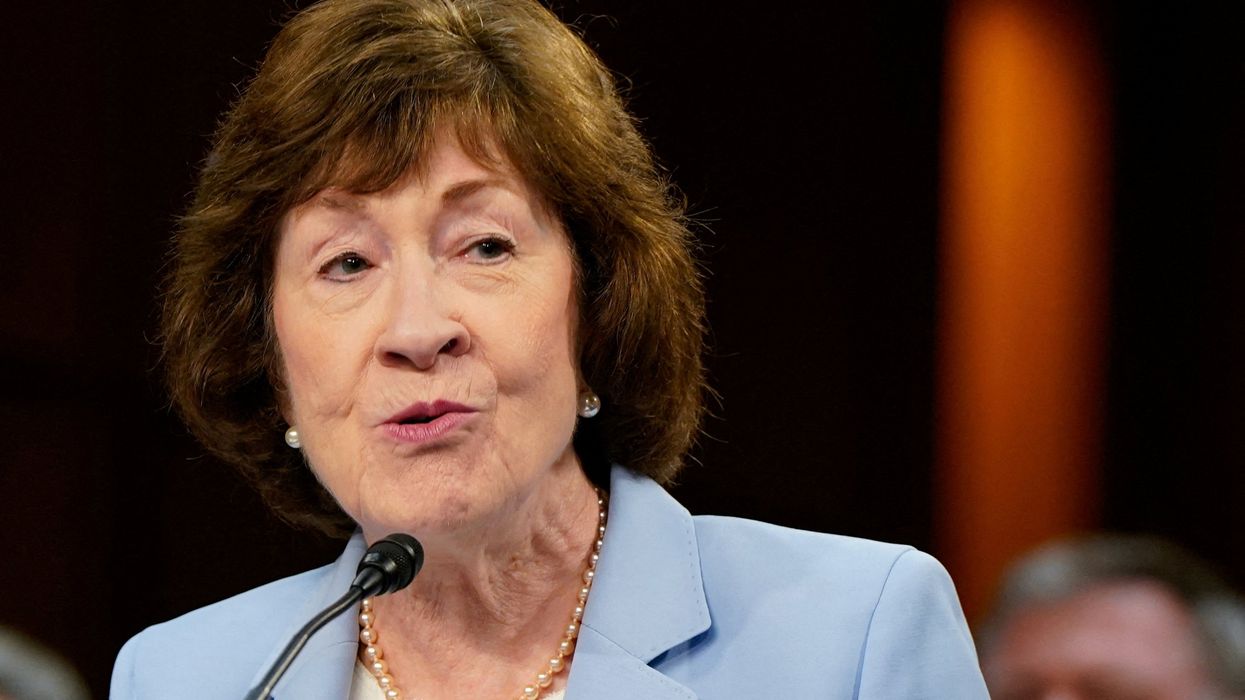As she gears up for a tough midterm race against a progressive challenger in 2026, Sen. Susan Collins is struggling to shake her reputation as a sellout to corporate interests. A new report out Wednesday may make that even more difficult.
Collins (R-Maine) was one of just three Republican senators not to vote for President Donald Trump's "One Big Beautiful Bill" Act in July, which slashes over $1 trillion from Medicaid to help pay for tax cuts for the rich and is expected to result in over 10 million people losing health insurance coverage.
But Collins did cast a crucial vote to advance the legislation to the Senate floor. An exclusive report from Tessa Stuart in Rolling Stone gives us damning insight into a possible reason why:
[Collins] cast that vote just one day after private equity billionaire Steve Schwarzman, the chair of the Blackstone Group and a man who will personally reap huge rewards from the bill, kicked in $2 million toward her reelection effort.On June 27, Schwarzman gave $2 million to Pine Tree Results PAC, a Super PAC backing Collins; on June 28, Collins cast a decisive vote allowing Trump's bill to advance to the floor. The vote was 51-49. Vice President JD Vance was present at the Capitol, on hand to break a tie, but was not needed after Collins voted in favor of the bill.
The bill went on to pass the Senate just a few days later, to Schwarzman's presumed delight, since the legislation both extended the pass-through business deduction—treasured by the owners of private equity firms—and made it permanent, allowing partnerships to deduct 20% of their pre-tax income.
Collins' office has strongly denied that Schwarzman's influence had anything to do with her vote to advance the bill. As press secretary Blake Kernen noted, a tie in the Senate would have been broken by Vance, so "the motion to proceed would have passed without her vote."
However, Stuart notes that this was not Collins' first conspicuous donation from Schwarzman or the private equity industry at large.
According to OpenSecrets, Collins' campaign committee and leadership PAC received over $715,000 from private equity and investment firms—more money than any other person elected to Congress during the 2020 election cycle. It included maximum individual contributions from both Schwarzman and his wife.
That number does not include an additional $2 million that Schwarzman donated to her reelection super PAC in 2020. As Stuart points out, this donation came after Collins dropped a proposed amendment to Trump's 2017 Tax Cuts and Jobs Act, opposed by private equity. That amendment would have "[made] childcare more affordable, by making changes to the private equity industry's beloved carried interest loophole," Stuart wrote.
While Collins denies that her votes are influenced by the piles of money gifted to her by private equity, one of her most formidable challengers in 2026, oyster farmer and Marine veteran Graham Platner, has often seized on her extensive industry ties to hold her up as the poster child for the "oligarchy" he is trying to unseat from power.
"I believe that input from working people is far more important than input from someone who simply has money," Platner thundered during a Labor Day speech in Portland alongside Sen. Bernie Sanders (I-Vt.). "I believe that we shouldn't be settling for crumbs while billionaires eat the cookie we baked. I don't think private equity deserves more time with a senator than someone who works two jobs to get by."
If Democrats are going to regain the Senate in 2026, Maine will be an essential state to win, something that looks increasingly possible as approval ratings for Collins have plummeted over the first half-year of Trump's second term.
Nearly 7,000 attended Platner's speech, during which he railed against the five-term senator Collins' long history of casting "symbolic" dissenting votes against her party, like opposing Trump's tax legislation, or voting to codify Roe v. Wade, to posture as a "moderate" without actually disrupting their agenda.
"Susan Collins' charade is wearing thin," Platner said Monday. "No one cares that you pretend to be remorseful as you sell out to lobbyists. No one cares while you sell out to corporations, and no one cares while you sell out to a president, who are all engineering the greatest redistribution of wealth from the working class to the ruling class in American history."
NOW READ:The only people who would mourn Trump's death


